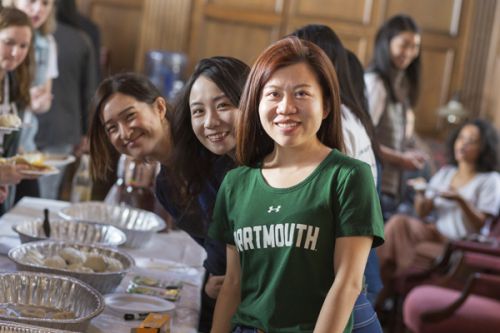To help you prepare for entry into the United States and transition to life as an MBA student, the information below describes a variety of services that may meet your needs.
United States immigration regulations and state laws apply to international students. All admitted students who are not U.S. citizens or permanent residents will be offered F-1 student immigration sponsorship in conjunction with Dartmouth’s Office of Visa and Immigration Services (OVIS). Students entering the United States to begin their program of study at Tuck are usually required to do so on Dartmouth’s immigration sponsorship, regardless of country of citizenship. Students should not enter the U.S. on a tourist visa or under the Visa Waiver Program, even if they are otherwise eligible for these routes of entry. Current U.S. immigration regulations for F-1 students permit entry to the U.S. up to 30 days prior to the program start date. For Tuck’s August 5, 2024 program start date, this date is July 6, 2024 (this will show as the “Earliest Admission Date” listed on your I-20).
Dartmouth Visa-Processing Requirements
After you accept your offer of admission and enroll at Tuck, you must do a few things to allow Dartmouth to begin processing your immigration documents:
- The International Budget Form is now available in your portal checklist. Please complete the information required (be sure to include proof of available funds such as a bank statement) and submit the form to Tuck Financial Aid. If you’re financing your education at least partially with Tuck Financial Aid, wait until you receive notification of your eligibility from Tuck’s Financial Aid office before you complete the form. The completed form and proof of funding is due to the Tuck Financial Aid office no later than June 14, 2024. Tuck will not process any forms received after this date therefore you would forfeit your ability to join the Tuck Class of 2026. After review and verification by staff at the Tuck School, your information will be forwarded to OVIS and used, in conjunction with documentation you submit via OVIS’s iDartmouth system, to process your Form I-20.
- Access available only after enrollment: Look for an email from Stacie J. Marshall with instructions for claiming your account and logging into OVIS’s iDartmouth system 1-2 weeks after you enroll.
- Complete the necessary iDartmouth forms and upload all required documents.
- OVIS will review your submission and if all is in order will issue your Form I-20 as a PDF sent to your email address.
Dependents
Unless otherwise specified, all international Tuck students will be sponsored for F-1 student visas. For complete F-1 visa information, see the OVIS website. If you have an accompanying spouse and/or children, they can also be sponsored by Dartmouth College for F-2 dependent visas. In addition to the required evidence of funds to cover your two-year education at the Tuck School, financial evidence of an additional $5,000 is required per accompanying spouse and $3,500 per accompanying child. Please also note, U.S. immigration regulations strictly prohibit employment by people in F-2 status, without exception (learn more on the OVIS website).
Visa Appointments
Once the appropriate immigration documentation is issued by OVIS, it will be emailed to you as a PDF to your Dartmouth email address. You will be instructed to print and sign this document. It will then be your responsibility to arrange for a visa interview at the U.S. embassy or consulate that has jurisdiction over where you reside. You are advised not to schedule a U.S. consular visa appointment prior to receiving your Form I-20 from OVIS. Dartmouth College will not be held responsible for any missed U.S. consular appointments scheduled prematurely. (Note: Canadian citizens are exempt from obtaining a visa stamp at the U.S. consulate, but will still need the I-20 form issued by OVIS to enter the U.S.) A complete list of all U.S. consular posts abroad can be found on the U.S. Department of State website. You may also find downloadable visa application forms and NONIMMIGRANT visa interview scheduling instructions through this site. Please note that U.S. consular visa application and appointment scheduling procedures vary depending upon the country in which you apply, so make sure you carefully read the instructions for your particular U.S. consular city. Visa appointment wait times are very different in each country, so keep in mind that the visa appointment scheduling of your friends and classmates might be vastly different than your own.
Significant visa issuance delays, especially during the summer months, can be expected. You are advised to inquire as soon as possible about the particular requirements at your nearest U.S. embassy or consulate. In many cases, you will be required to schedule an appointment well in advance. All initial visa applicants are required to have an in-person interview with a U.S. consular official (with the exception of Canadian students, who are exempt from needing to obtain an actual visa from a U.S. embassy or consulate). Also, all visa applicants to the U.S. are potentially subject to an enhanced background security check at the discretion of the particular consulate. Please note, there is no mechanism to expedite such a security clearance if you are subjected to one.
Visa Fees
All F-1 student visa applicants are subject to a supplemental “SEVIS” I-901 fee to be paid to the Department of Homeland Security before you apply for your student visa. You will need to pay the specific SEVIS fee online. Please see detailed information about the SEVIS fee and how to pay it online on the U.S. Immigration and Customs Enforcement website. Note that Canadian citizens DO need to pay the SEVIS fee and should bring the SEVIS fee receipt to the US port of entry.
Keep in mind that the SEVIS fee is separate from the additional $185 per-person worldwide U.S. visa application fee, which is paid when scheduling your visa appointment. Citizens of certain countries are also subject to visa issuance fees.
Visa/Non-Immigrant Status Information
Finally, it is very important to reiterate that by applying for an F-1 visa, you are intending to enter the U.S. as a non-immigrant. This means that you must satisfy the consular official that you are not intending to come to the U.S. for any purpose other than academic study. The most common reason for visa denial is the failure of the applicant to prove and document “non-immigrant intent” to U.S. consular officials. You should always be prepared to present convincing evidence that you have substantial ties to your home country (i.e., employment opportunities when you return home, family ties, property ownership, financial holdings abroad, etc.). Expressing interest or intention to work in the U.S. in the future is inconsistent with the category of visa you are currently applying for.
Change of Immigration Status from within the U.S.
If you are currently residing and working in the U.S. (for example on an H-1B or L-1/L-2 visa) you can apply for a change of your current immigration status to that of F-1 student. These applications can take 9-13 months to get adjudicated (approved) by immigration and as such are not appropriate in all cases. Note that once approved, an application for a change of status will not provide you with a new F-1 visa stamp in your passport, only a change of your immigration status to F-1. Any subsequent trips outside the U.S. after a change of status application (i.e., during the holiday break in December) will require a U.S. consular appointment (see above) to obtain an F-1 visa before you would be allowed to re-enter the U.S. in F-1 status to resume your studies in August. Keep this in mind when considering whether or not to travel abroad during the summer prior to starting your MBA studies in August. Also note that a change of status application is not permitted for anyone currently in the U.S. under the visa-waiver program (short-term visitor for business or pleasure).
Any questions regarding a possible change of status should be discussed directly with OVIS in advance since there are lengthy processing times for these applications with immigration. Coordination with a qualified immigration attorney is recommended for changes of status.
Related Links and Contact Information
- Dartmouth College Office of Visa and Immigration Services (OVIS)
- Worldwide U.S. Embassies and Consulates
- U.S. State Department Student Visa Information
- Boston Logan International Airport
- Dartmouth Coach
Dartmouth College Office of Visa and Immigration Services (OVIS)
Dartmouth’s Office of Visa and Immigration Services (OVIS) is here to support you by:
- informing international students, faculty, and researchers of U.S. government immigration regulations and related travel documentation and other issues
- providing academic, personal, and cultural counseling to all international students and scholars
- referring persons to other appropriate resources, including deans of graduate/professional schools, health services, the Social Security Administration, and the Department of Motor Vehicles
- helping departments and administrative offices become more aware of the needs of our international student body
OVIS also sponsors special workshops throughout the year on topics that affect international students and their immigration status in the United States. You will receive notices of these sessions, and you can learn more on the OVIS website. If you have any questions, please email ovis@dartmouth.edu.
For more information on your visa and traveling, visit the Bureau of Consular Affairs. For information on worldwide U.S. embassies and consulates, visit U.S. Embassy.

